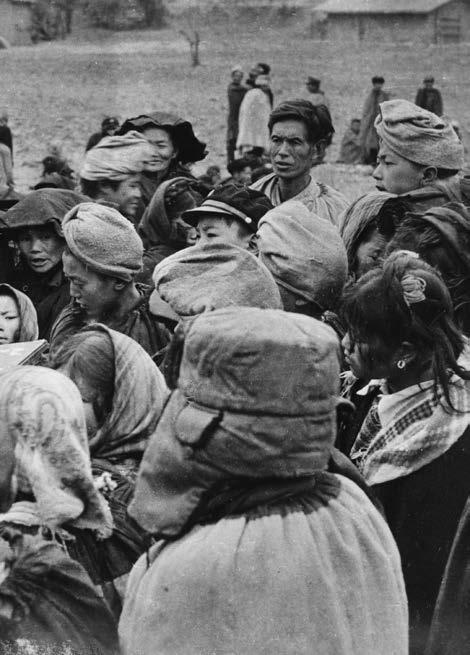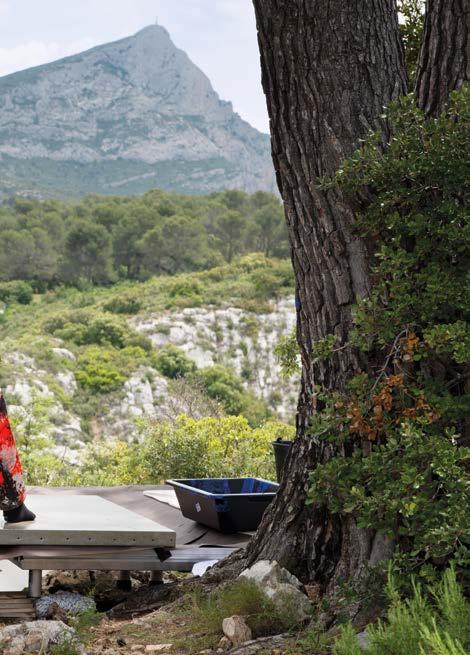

In my white socks and blue skirt
While the impetuousness of youth has yet to be tamed . . . *
Childhood is endured, but youth has choices. My choice was to paint, but first I had to master a technique, and this would take me to China.
Life can have the beauty of a bonsai or an old wind-buffeted pine tree by the seaside. We find its craggy form appealing, but how much did it suffer to grow this way? If its beauty is unique, it is because it was battered by storms and all manner of harsh weather. Everyone and everything is what they are as a result of the violent forces and torments they have braved. It has always been this way.
I’m not writing to settle scores with family, friends, institutions, or even the age into which I was born. What I hope to relate here is the story of the journey I took to find my own style of painting. Along the way, I will tell some stories from my life, as I also want to describe the realities of living in China during this time. In spite of the Kafkaesque prison-like world it was in the 1980s, after the ravages of the Cultural Revolution, the vestiges of a magnificent civilization still survived.
Some people criticize my approach to Chinese painting and call it inauthentic, but they have no problem when Asians study in the West and become great international artists—artists like the painter Zao Wou-Ki, or the cellist Yo-Yo Ma, or the academician and writer François Cheng, who became the first Asian elected to the Académie Française. Why, then, shouldn’t a European woman like me take the reverse path? Why shouldn’t I become a student of Chinese painting, learn its poetic and philosophical codes, extract their essence, and, using this ancient tradition, create my own original works?
I was sixteen when I told my mother I wanted to be a painter. I was the eldest of five, and my mother unhappily resigned herself to my early departure. She had done her best to raise us alone. She was a woman deeply wounded by divorce; not only by the painful loss of my father, her first love, but also by his betrayal of the solemn vows made before God, which broke her belief in promises.
Throughout childhood, I picked up on the slightest signs of my mother’s suffering and, at her side, silently relived these injustices over many years. This might explain why I was so difficult back then, with a muted internal rebellion. I was so young but already so sad, a child searching for an escape.
Wearing white socks and a blue skirt, I left my mother and my Catholic school to join my father, with whom I had not lived since I was eight. As my father had studied art, an initial training with him seemed a natural place to start my journey of apprentice painter. All I took with me was my mother’s good upbringing.
He lived in a large remote hillside farm on sixty hectares facing the Pyrenees Mountains. Not a soul lived for miles around. The house had a 180-degree view of forests, little valleys, and vineyards planted along the Malepère hills between Carcassonne and Limoux. It had a magical beauty, perfumed by wild thyme, but this idyllic life turned out to be ruthless and austere. Our neighbors did not like Parisians. They considered us affluent strangers and we were not welcome. However, the initial jolt was good for me, and, for better or worse, I was forced to train in the tough school of life in the country.
My father was an idealist who had taken part in France’s revolutionary May ’68 protests. He constantly pursued unreachable ideals and left a lot of destruction in his wake. His motto was: “If you love me, you’ll follow.” He compared raising children to the harsh realities of nature and believed in pushing his fledglings out of the nest to teach them to fly. If some perished, it was because they were not strong enough, and ultimately for the best. The countryside proved the perfect place for his perpetual questioning. He loved intense, exhausting experi-
Beijing via Karachi
Distant traveler, why come here to follow such an arduous path?
I was headed for the land of literati and painters, refinement and poetry, wisdom and great cuisine. It felt like a dream. But I still had to get there. I had bought a ticket to Beijing on Air Pakistan. At the airport in Paris, I learned that the flight had been delayed by a day for mechanical reasons so I was put up in a drab hotel overnight. When we arrived in Karachi for a stopover, a flight attendant informed us that we would have to wait another twenty-four hours because of a defective jet engine.
I had my first experience of the developing world at the airport. It was a shock that I will remember for the rest of my life. It was summer, the heat was stifling, and the light terribly harsh. I found myself facing a crowd of destitute people and starving children with flies in their eyes. A European meant wealth, so they pulled at my hair and clothes, grabbing my backpack. I couldn’t get away. They kept coming in increasing droves. At the exit more beggars, in even greater numbers, pressed up against me. I fainted.
I came to inside a car with windows veiled by little curtains. I recognized the men in the car from the flight—a team of field hockey players returning home. I wondered what had happened to me. Where was I? Where was I going? “You fainted,” someone told me. “We’ll take care of you. Don’t worry.” I peeked through a slit in the curtains. We were driving through slums and it was already pitch dark. I was terrified. When I begged them to stop the car, they burst out laughing. “You’d never find your way. This is a bad part of town. A woman can’t just walk
around freely here. You’d be torn to pieces.” They took me to a deserted old house in an isolated area and locked me up in the bedroom. There were bars across the windows. The whole team was there, with the coach lewdly eyeing me. The entire group was gearing up for the fun. I was frightened, but I decided it was better to be raped by one than many, so I bargained with the coach: “I understand. I’ll spend the night together with you, but could you please make sure the others stay in the next room?”
All night long, the others drank and pounded on the door for their share of the prize. They didn’t think about anything else, shouting crude jokes to the chosen one. The sole comfort I had was the presence of the moon, my only solace in this place of sordid violence. There was nothing I could do; screaming was no use. Submission was the only way to survive. After the night of debasement, I said to the coach, “They’re expecting me at the French Embassy.” My greatest fear was that I would not be able to return to the airport. Perhaps moved by my plight and our “memorable” night together, he took me where I asked.
By the time I landed on Chinese soil I was in a terrible state. I had been told by the French Ministry of Foreign Affairs that someone would be sent to meet me. Since I was twenty-four hours late, though, no one was at the airport. Because it was a Saturday, the diplomatic offices were closed. To make it worse, it was raining. It was September 1983, and while it was still very hot in Karachi, in Beijing the weather was dreary. My arrival was a disappointment—I felt like I had landed in a military camp surrounded by loudspeakers. I did not have a yuan to my name and needed to change money. I was miserable and I was bleeding.
I did have a few addresses of Chinese professors at the China Central Academy of Fine Arts in Beijing. I turned up at the home of one, who was baffled by my presence. I explained to him that I had just arrived via Karachi and experienced some problems along the way. I was to leave for the Sichuan Fine Arts College but first I had to fill out papers at the French Embassy, which, unfortunately, was
























5 CONTINENTS EDITIONS
Editor-in-Chief: Aldo Carioli
Art Director and Layout: Stefano Montagnana
Editing: Charles Gute
Translation from German (Transposing and Inventing): Gérard Goodrow
Index and Glossary: Corinna Thierolf, Carl Freytag, Kelly Ma
Pre-press: Maurizio Brivio, Milan, Italy
All rights reserved © Éditions Albin Michel – Paris 2003
Original title: Passagère du silence. Dix ans d’initiation en Chine
For the present edition: © 5 Continents Editions / Waddington Custot Gallery / Fabienne Verdier
© Corinna Thierolf for her text
ISBN 979-12-5460-063-4
Printed and bound in Italy in October 2024 by Tecnostampa – Pigini Group Printing Division Loreto – Trevi for 5 Continents Editions
5 Continents Editions s.r.l.
Piazza Caiazzo 1, 20124 – Milan, Italy info@fivecontinentseditions.com www.fivecontinentseditions.com
